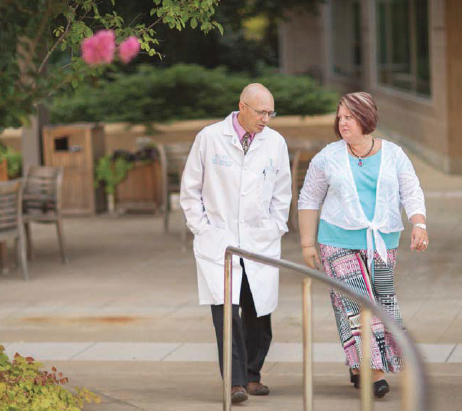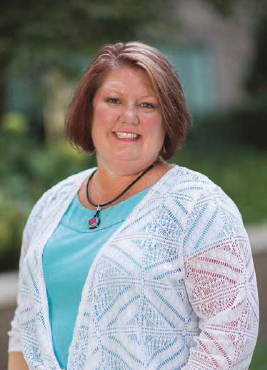After years of providing spiritual guidance and counseling to UNC patients, many of whom had cancer, the tables turned on hospital chaplain Shay Greene. On Sept. 16, 2011, she was diagnosed with Stage 3 breast cancer. Following a mastectomy, radiation, chemo and breast reconstruction, Greene says she was changed forever. Here, she tells the story of how a pen and paper became the tools that helped her move forward in her own faith and renewed her ministry to others who are going through cancer.


I’m no stranger to cancer. I’ve been a hospital chaplain for more than 23 years, and I consider it a privilege to share in the joy and the pain that is often a part of the journey for many cancer patients. In 2009, I saw the disease from the perspective of caregiver when my mother was diagnosed with breast cancer and had a mastectomy. My mother lived with me for a month while she recuperated. It was a difficult time for me and my family, so I understand the stress and worry many caregivers face.
In late 2010, I began to date the man of my dreams, Jeff Greene. But in September 2011, just ten months after we started dating, I found a lump in my right breast while taking a shower. I was confused because a month earlier, I went to my annual GYN visit, and I got a clean bill of health. I got a mammogram, which led to diagnostic mammography, which led to a biopsy. On September 16, 2011, I was diagnosed with breast cancer and later found out it was Stage 3. One of my oncologists, Dr. Hy Muss, called it an ‘interval cancer,’ which is a fast-growing cancer that appears less than 12 months after a negative breast screening.
I worked with my doctors to map out my treatment plan. I went through eight rounds of preoperative chemotherapy before my surgery — once every two weeks for a total of 16 weeks from October 2011 through January 2012. I suffered from ‘chemo brain,’ blurred vision, hair loss, and exhaustion. I wore a wig when I lost my hair, but eventually, my hair grew back.
I was adamant about maintaining my privacy, so I only shared my condition with my UNC Pastoral Care staff and the Vice President to whom I report, and I swore them to secrecy.
When I’d go to chemo, I’d ride the back hall elevator of the N.C. Cancer Hospital to my treatments on Mondays so I wouldn’t see any coworkers. I’d take my laptop with me, and I’d work during my treatment. I wasn’t going to let cancer interrupt my life any more than I had to.
After I completed my chemotherapy, I rested for about a month before my surgical oncologist Dr. Nancy DeMore did my mastectomy. My cancer had spread to the lymph nodes, and she removed 22 during the surgery. Dr. Clara Lee was the plastic surgeon who later did my breast reconstruction. In March 2012, I started radiation, five days a week for five weeks, and that’s when fatigue set in.
Around that same time, my coworker Heidi Gessner, the Bereavement Coordinator at UNC Hospitals, and local writer Carol Henderson began working together to create a writing program called ‘Writing for Caregivers.’ Their thought was, ‘Why not offer an opportunity like expressive and creative writing to help anyone in the hospital to heal, regardless of their issue?’ In January 2013, the writing group came to fruition, thanks to a grant from Project Compassion. The writing sessions are now offered weekly through the hospital’s bereavement program.
In my writing, I talked about loss, about losing a part of my body. My writing became graphic, and I finally was able to own the fact that I had lost a breast to cancer.
When I first attended the writing program, I was very reticent about sharing my experiences and feelings with other participants, but doing so helped me accept that I had cancer. I wasn’t playing the role of minister; I could be vulnerable with others and my staff. Writing gave me the freedom to say, ‘I’m not alone in this,’ and it gave my heart and my head a chance to come together and reconcile in this group. I poured out my emotions weekly and mourned over the experience. In my writing, I talked about loss, about losing a part of my body. My writing became graphic, and I finally was able to own the fact that I had lost a breast to cancer.
On November 4, 2014, UNC Hospitals celebrated National Grief Day, and organizers sponsored a poetry reading. I was encouraged to read a piece I’d written in my writing class. When I told a standing-room-only crowd at the reading that, “My name is Shay Greene, and I’m a cancer survivor.” Mouths dropped to the floor. Hardly anyone knew that I’d been sick. Now I work on 5 West, and I visit patients with similar conditions. Cancer has changed my ministry, because now I know on a different level what the words ‘I have cancer’ mean. People are in deep despair, and they may not share their fears with their spouse, their family or their friends. That’s why I’m there. I share their feelings.
A cancer diagnosis often brings about spiritual distress, and part of being a chaplain is assessing people’s spirituality or faith expressions. When I know someone is a person of faith, I ask them a few simple questions: Do you feel God’s presence? Are you talking with God? Are you fighting with God? I listen to the answers and assure them there is no right or wrong answer. I remind them that moving out of spiritual distress is a journey that brings about change and takes time. I’ve been in that muck, I’ve struggled with anger towards God. I’ve grieved, I’ve felt hopeless, scared, and emotionally exhausted. But it wasn’t until I was able to put words to my grief that I was able to move out of spiritual distress and, through my faith, claim hope.
Writing is a way I still care for myself, and when I share, I know I’m helping others. Now I am moving into a stage of feeling possibility and hope. I have so much to be thankful for, and I realize I don’t have to live life worrying about the future. I can ask questions and then leave them on paper, knowing the answers don’t have to come right now.
Shay and Jeff married on June 16, 2012 at Topsail Beach, N.C. They enjoy celebrating new beginnings with their blended family.
